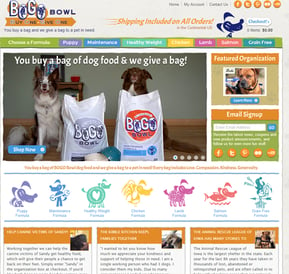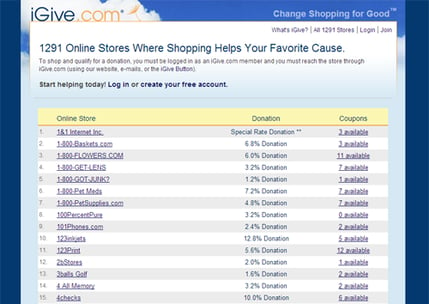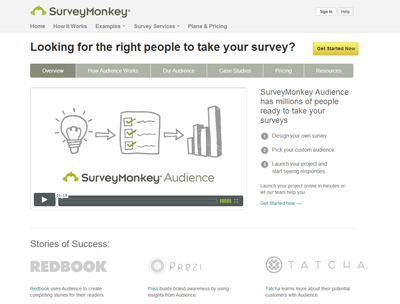3 Ways Merchants Can Make a Difference

When the going gets tough, Americans gets giving. This is because the United States is one of the most charitable nations in the world. In fact, in the last five years, the U.S. ranks third in global giving behavior overall, behind Australia and Ireland, according to the World Giving Index 2012, which looks at giving time, money and help to strangers.
Worldwide, it seems the list of causes that deserve our time, attention and dollars keeps growing. Fortunately, there are plenty of ways (three of which are discussed below) for digital enterprises to help increase their social impact and still chase the American dream by growing their business in the process.
 Buy One, Give One
Buy One, Give One
The first charitable strategy we'll look at is the BOGO offer. In this context, that refers to buy one, give one. This most likely sounds familiar, because this is the model Toms Shoes company was made famous by. In Toms's case, with every pair of shoes purchased, a new pair is donated to a child in need. Other companies follow a similar model.
For example, with each bag of dog food purchased from BOGO Bowl, an online premium dog food supplier, a bag of food is donated to a dog in need. Since its 2012 launch, BOGO Bowl has donated almost 21,000 pounds of matching food (roughly 84,000 bowls) to organizations like shelters and rescues, foster-based programs and pet pantries.
This program has legs (four, in fact), because despite its recent beginnings, BOGO Bowl has grown an impressive following thanks to exposure via social media, email marketing, word of mouth and other publicity, such as its appearance on the Today Show last September.
"Most people don't realize the cost of sheltering a dog or cat for a single day averages $12.50 or $300 per month," said BOGO Bowl Founder Sara Henderson who started and ran a charity, The Pet Project, which operates a Pet Pantry program. "The cost of a bag of food is a lot less. If a dog does end up in the shelter, having high-quality food keeps them in better health mentally and physically, making them more adoptable."
After managing the Pet Pantry program for three years, Henderson learned how difficult it was to get healthy food for at-risk animals and made that the focus of her new business operations.
"Often it was a struggle to get donations of not-so-great food in damaged packaging, so quality food was nearly impossible to come by unless we purchased it," said Henderson. "So, I set about determining if there was a 'sweet spot' - a point where I could make and sell really good food at a price that would allow us to give away a second bag of the exact same food to an at-risk dog in the buyer's own community.
"Fortunately, it worked and BOGO Bowl was born. We have more than 50 organizations signed up and plan to add many more. There are 700 pantries we're aware of, and 13,000 groups listing adoptable pets on Petfinder at any given moment. We see no reason we can't help them all."
Helping at-risk animals is just one of the many causes that companies can attach their brand to and grow their business in the process.
"There are so many things that need fixing, and if a business can find a way to help make a dent in that as part of their business model, it only makes sense," said Henderson. "It doesn't have to be as dramatic as what we do (making our food intending to give 50 percent or more away); even setting aside a dollar from each sale to a charity that makes sense for the business is effective or adopting a cause that is relevant to your customers and finding a way to affect it."
 iGive.com
iGive.com
One way merchants, in particular, can affect the causes their customers care about is with iGive.com, which connects around 350,000 socially conscious shoppers with more than 1,57 socially responsible stores to help 35,000-plus causes.
"The iGive shopper (80 percent women) chooses to shop at stores that help her cause," said iGive founder, Robert N. Grosshandler. "She actively considers whether or not a merchant is being socially responsible. Even more importantly, she cares about her local charity...the pet rescue, the kindergarten class, the local chapter of a disease fighting charity. And because it's local, she feels a strong connection, and is willing to make shopping choices that reinforce that connection. Better yet, she tells her friends when a store is going to help, so not only are conversions helped, but volume goes up, too."
iGive works with the majority of major affiliate networks, so to get started a merchant would contact their network or visit iGive's page for merchants and advertisers and iGive will do the rest.
 SurveyMonkey Audience
SurveyMonkey Audience
SurveyMonkey also does the legwork for companies looking to add a level of social responsibility to their operations, with its product called SurveyMonkey Audience. This is the popular consumer insight platform's donation-based feature, which gives companies access to a target demographic for whatever their survey project needs may be.
SurveyMonkey donated nearly $450,000 in 2012 and has a $1 million goal for 2013. It works with nearly three dozen charities, with several thousand waiting to get on board. According to Brent Chudoba, Vice President, General Manager of SurveyMonkey Audience, the reason why so many organizations are waiting to partner with the product is because SurveyMonkey Audience takes the necessary time to ensure it's compliant with all federal and state laws, that it's offering diverse charities to select from and that it's building in-depth relationships with its partners.
Companies can also benefit from this methodical approach, because when people take surveys to help great causes, the result is clean, reliable data.
"Charity is where we put our stake in the ground," said Chudoba. "And the things that happen as a result are higher data quality and much more efficient surveys."
The decision to add charitable elements to a business's operations is not one that should be made lightly. While we all want to do right by our planet, our animals and each other, giving to the wrong organizations (as defined by ones not practicing in legal or ethical manners) can have a negative impact on a company. The BBB offers these standards for charity accountability, which can assist donors in making sound giving decisions and can foster public confidence in charitable organization..
"People are starting to look harder at the companies they buy from, and having some sort of corporate responsibility or social bend is definitely seen as a plus," said Henderson.








